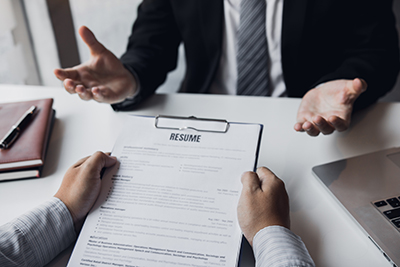How to Write an Effective Cover Letter
One of the most challenging parts of the job application process may just be writing an effective cover letter. Searching for a job can be a job in itself – it’s time-consuming, exhausting, overwhelming, and at times, discouraging.
Luckily, there are a few tips you can incorporate in your cover letter that are sure to help you gain interest and land the job you’ve been looking for. Keep reading to find out how you can improve your cover letter.
During the job searching process, a question that constantly plagues applicants is whether they should submit a cover letter with their application – the answer is yes. By including a cover letter, you show the human resources department or hiring manager that you took an extra step to distinguish yourself from others.
So now, how do you write an effective cover letter? Use the 5 tips to help:
- Do Your Research
- Emphasize Your Personal Value
- Focus on the Future
- Keep it Short
- Be Cautious With Your Tone
Each of these 5 tips will help you craft a letter that shows your preparation, dedication, personal experience for reviewers to see. Let’s dive into how these steps can set you apart from other applicants – and help you land the job.

1. Do Your Research
Before you begin writing, find out more about the company or organization you are applying to, as well as the specific job you want. If you are applying online, using words directly from the job description can help flag your letter and let the hiring manager know you are a qualified applicant.
It is important to think about the culture of the organization you’re applying to and relate that to how you find yourself fitting into it. This will demonstrate that you can envision yourself in the role and how you see yourself contributing to the company.
During your research, see if you can determine who the hiring manager is so that you can personally address the letter. If at all possible, you can even reach out to them, asking a question about the job, and you can reference the interaction at the start of your letter.
The research process before writing your cover letter can help you establish the right tone for your letter, and help you figure out if this is a job you really do want.
2. Emphasize Your Personal Value
While your resume is the place where you detail your work experience, your cover letter gives you a chance to expand upon this experience – detailing how it can translate to this new role.
Explain how your past job experience has prepared you to face challenges in the new job, how you solved a problem or achieved a goal that sets you apart from others.
Three trigger words are relevant to any job you can apply to: contribute, learn, and adapt. Take these descriptors and provide examples of how you’ve used them in the workplace, such as helping a colleague finish a project on time.
You are trying to emphasize how your skills, education, knowledge, and experience will be of value to the company you’re applying to – how, combined, they propel you above other applicants and make you a better choice.

3. Focus On The Future
It is important to reference the experience you’ve gained from past jobs. However, the tone of your cover letter should focus on how you want to take that into the future.
Whether you are staying in the same industry or entering a whole new one – anything you learned in a prior role you can take with you into a new one.
When writing your cover letter, you have an opportunity to sell yourself as someone who is flexible and whose skills can transfer into any position.
By focusing on the future, you can open it up and give some examples of how you would take an experience or skill you already have and how you would use it in the new role.
4. Keep It Short
Keeping the cover letter short is one of the most difficult things to do, especially when you want to describe everything already mentioned. A cover letter should be, at most, one page, but ideally even shorter.
Be succinct, try to get your point across with strong words in short thoughts. Following a line formula can help you shorten your sentences and ensure that the most important points are the only ones included.
The line formula can be different for everyone, but generally, you should have a 1-2 sentence/1-2 line introductory paragraph. The next paragraph, or two paragraphs, can be between 4-5 lines followed by a concluding statement that is about 1-2 lines long.
Along with keeping everything short and to the point, make sure your formatting is easy to read. It is always a good idea to have a friend or mentor review your cover letter to check for mistakes, advise on how to make a thought clear, and tell you if you need to change anything.
5. Be Cautious With Your Tone
Be authentic. While you want to use some strong language that demonstrates your skills and knowledge, you don’t want to be too “flowery” or sound too desperate.
Stay professional while still conveying why you want the job and why you are the best candidate.
A good way to check how your message is coming across is to think of yourself as the hiring manager – what would you think about this applicant if you were hiring them? Don’t go overboard with your excitement, just say what you mean and promote yourself professionally.
One of the best ways to discern what your tone sounds like is to write a complete draft, then leave it alone for a few hours and come back with a fresh perspective. Asking friends and trusted mentors to review the draft is also extremely helpful and important.

Start Writing
We have now explored how each of these tips can help you craft an effective cover letter – so it’s time to get writing! Getting started is one of the hardest parts, but with these tips, you can get in the right mindset to create your effective cover letter.
One of the most important and most helpful things you can do with your cover letter is to give it to trusted friends and family to review.
Often when we write something, it is difficult to review the piece with a new, fresh lens. Having others look at the letter can bring to light some mistakes or thoughts that aren’t clearly portrayed.
Another thing to keep in mind when writing both a resume and a cover letter is to format it carefully. If you are applying to a corporate or more professional job – keep things basic and easy to read.
Feel free to add a neutral color to the heading or as some sort of border, but otherwise keep it neat. If you are applying to a more artistic role, take some risks and be creative – you will likely stand out and be rewarded for it.
When you use these 5 tips for writing an effective cover letter, you will be well on your way to finding the job of your dreams! First impressions are important and a cover letter is the start of that impression – it is often the thing that gets you in the door for an interview in the first place.
Related Questions
Is It Important to Change Your Cover Letter for Each Job You Apply to?
As you begin your job search, preparing a resume and cover letter template is a really helpful idea. These templates allow you to change certain language or information depending on the specific job you are applying to – without having to rewrite or recreate a whole document.
You should change the cover letter and resume according to the job you are applying to. This will help tag your profile in online applications because you have included certain words that the employer has emphasized in the job description, and it shows the hiring manager that you took the time to create a specified document rather than submitting something generic.
Why is Writing a Cover Letter Important?
Cover letters give hiring managers more insight into you as an individual and can help them decide to give you an interview. Where resumes detail your education and employment background, your cover letter is a place to go into more depth, before a potential interview.
A cover letter will let a hiring manager develop a better understanding of how you may fit into the new role. It is also the start of their first impression of you.
Truthfully, cover letters are not always reviewed. However, writing and submitting one likely gives you at least a 50% chance of being noticed and selected above other applicants who did not submit a cover letter. Take the extra step – it is worth it.

